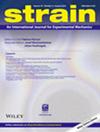An artificial neural network for digital image correlation dynamic subset selection based on speckle pattern quality metrics
IF 2.4
3区 材料科学
Q2 MATERIALS SCIENCE, CHARACTERIZATION & TESTING
引用次数: 0
Abstract
Precise and accurate digital image correlation computed displacement data requires sufficient noise suppression and spatial resolution, which improve and diminish, respectively, with increased subset size. Furthermore, spatially varying speckle pattern quality and displacement field complexity ideally necessitate a location‐specific optimal subset size to obtain a favourable compromise between noise suppression and spatial resolution. Although dynamic subset selection (DSS) methods have been proposed based on speckle pattern quality metrics (SPQMs), they do not ensure such a favourable compromise.This work investigates using an artificial neural network (ANN) for DSS. An ANN is trained to predict the displacement error standard deviation of a subset from multiple SPQMs and the standard deviation of image noise, such that the smallest subset offering sufficient noise suppression, dictated by a displacement error standard deviation threshold, is appointed.Validation, both within and outside the domain of the training images, shows that the smallest subset providing sufficient noise suppression offers a favourable compromise for up to moderate displacement gradients. Additionally, the proposed method is shown to perform with greater consistency and reliability relative to existing SPQM‐based DSS methods.The novel proposition lies in utilising an ANN as an error prediction tool, based on multiple SPQMs, and hence, is an attractive alternative for DSS.基于斑点模式质量指标的数字图像相关动态子集选择人工神经网络
精确的数字图像相关计算位移数据需要足够的噪声抑制和空间分辨率,随着子集大小的增加,噪声抑制和空间分辨率分别会提高和降低。此外,由于斑点模式的质量和位移场的复杂性在空间上各不相同,理想情况下需要根据具体位置确定最佳子集大小,以便在噪声抑制和空间分辨率之间取得有利的折衷。虽然已经提出了基于斑点模式质量指标(SPQMs)的动态子集选择(DSS)方法,但这些方法并不能确保实现这种有利的折衷。对人工神经网络进行了训练,以预测多个 SPQMs 子集的位移误差标准偏差和图像噪声标准偏差,从而根据位移误差标准偏差阈值,指定能够充分抑制噪声的最小子集。此外,与现有的基于 SPQM 的 DSS 方法相比,所提出的方法具有更高的一致性和可靠性。新颖的主张在于利用基于多个 SPQM 的 ANN 作为误差预测工具,因此是 DSS 的一种有吸引力的替代方法。
本文章由计算机程序翻译,如有差异,请以英文原文为准。
求助全文
约1分钟内获得全文
求助全文
来源期刊

Strain
工程技术-材料科学:表征与测试
CiteScore
4.10
自引率
4.80%
发文量
27
期刊介绍:
Strain is an international journal that contains contributions from leading-edge research on the measurement of the mechanical behaviour of structures and systems. Strain only accepts contributions with sufficient novelty in the design, implementation, and/or validation of experimental methodologies to characterize materials, structures, and systems; i.e. contributions that are limited to the application of established methodologies are outside of the scope of the journal. The journal includes papers from all engineering disciplines that deal with material behaviour and degradation under load, structural design and measurement techniques. Although the thrust of the journal is experimental, numerical simulations and validation are included in the coverage.
Strain welcomes papers that deal with novel work in the following areas:
experimental techniques
non-destructive evaluation techniques
numerical analysis, simulation and validation
residual stress measurement techniques
design of composite structures and components
impact behaviour of materials and structures
signal and image processing
transducer and sensor design
structural health monitoring
biomechanics
extreme environment
micro- and nano-scale testing method.
 求助内容:
求助内容: 应助结果提醒方式:
应助结果提醒方式:


